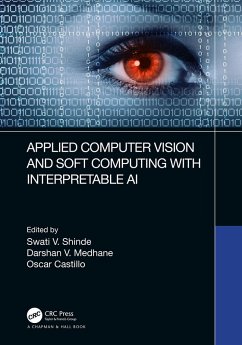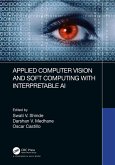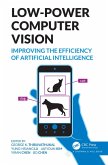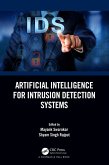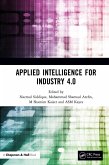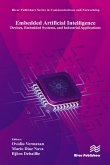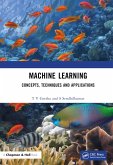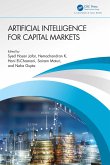Applied Computer Vision and Soft Computing with Interpretable AI (eBook, ePUB)
Redaktion: Shinde, Swati V.; Castillo, Oscar; Medhane, Darshan V.
52,95 €
52,95 €
inkl. MwSt.
Sofort per Download lieferbar

26 °P sammeln
52,95 €
Als Download kaufen

52,95 €
inkl. MwSt.
Sofort per Download lieferbar

26 °P sammeln
Jetzt verschenken
Alle Infos zum eBook verschenken
52,95 €
inkl. MwSt.
Sofort per Download lieferbar
Alle Infos zum eBook verschenken

26 °P sammeln
Applied Computer Vision and Soft Computing with Interpretable AI (eBook, ePUB)
Redaktion: Shinde, Swati V.; Castillo, Oscar; Medhane, Darshan V.
- Format: ePub
- Merkliste
- Auf die Merkliste
- Bewerten Bewerten
- Teilen
- Produkt teilen
- Produkterinnerung
- Produkterinnerung

Bitte loggen Sie sich zunächst in Ihr Kundenkonto ein oder registrieren Sie sich bei
bücher.de, um das eBook-Abo tolino select nutzen zu können.
Hier können Sie sich einloggen
Hier können Sie sich einloggen
Sie sind bereits eingeloggt. Klicken Sie auf 2. tolino select Abo, um fortzufahren.

Bitte loggen Sie sich zunächst in Ihr Kundenkonto ein oder registrieren Sie sich bei bücher.de, um das eBook-Abo tolino select nutzen zu können.
This reference text presents the knowledge base of computer vision and soft computing techniques with their applications for sustainable developments.
- Geräte: eReader
- mit Kopierschutz
- eBook Hilfe
Andere Kunden interessierten sich auch für
![Applied Computer Vision and Soft Computing with Interpretable AI (eBook, PDF) Applied Computer Vision and Soft Computing with Interpretable AI (eBook, PDF)]() Applied Computer Vision and Soft Computing with Interpretable AI (eBook, PDF)52,95 €
Applied Computer Vision and Soft Computing with Interpretable AI (eBook, PDF)52,95 €![Low-Power Computer Vision (eBook, ePUB) Low-Power Computer Vision (eBook, ePUB)]() Low-Power Computer Vision (eBook, ePUB)47,95 €
Low-Power Computer Vision (eBook, ePUB)47,95 €![Artificial Intelligence for Intrusion Detection Systems (eBook, ePUB) Artificial Intelligence for Intrusion Detection Systems (eBook, ePUB)]() Artificial Intelligence for Intrusion Detection Systems (eBook, ePUB)52,95 €
Artificial Intelligence for Intrusion Detection Systems (eBook, ePUB)52,95 €![Applied Intelligence for Industry 4.0 (eBook, ePUB) Applied Intelligence for Industry 4.0 (eBook, ePUB)]() Applied Intelligence for Industry 4.0 (eBook, ePUB)47,95 €
Applied Intelligence for Industry 4.0 (eBook, ePUB)47,95 €![Embedded Artificial Intelligence (eBook, ePUB) Embedded Artificial Intelligence (eBook, ePUB)]() Embedded Artificial Intelligence (eBook, ePUB)102,95 €
Embedded Artificial Intelligence (eBook, ePUB)102,95 €![Machine Learning (eBook, ePUB) Machine Learning (eBook, ePUB)]() T V GeethaMachine Learning (eBook, ePUB)157,95 €
T V GeethaMachine Learning (eBook, ePUB)157,95 €![Artificial Intelligence for Capital Markets (eBook, ePUB) Artificial Intelligence for Capital Markets (eBook, ePUB)]() Artificial Intelligence for Capital Markets (eBook, ePUB)47,95 €
Artificial Intelligence for Capital Markets (eBook, ePUB)47,95 €-
-
-
This reference text presents the knowledge base of computer vision and soft computing techniques with their applications for sustainable developments.
Dieser Download kann aus rechtlichen Gründen nur mit Rechnungsadresse in A, B, BG, CY, CZ, D, DK, EW, E, FIN, F, GR, HR, H, IRL, I, LT, L, LR, M, NL, PL, P, R, S, SLO, SK ausgeliefert werden.
Produktdetails
- Produktdetails
- Verlag: Taylor & Francis eBooks
- Seitenzahl: 332
- Erscheinungstermin: 5. Oktober 2023
- Englisch
- ISBN-13: 9781000952551
- Artikelnr.: 68603334
- Verlag: Taylor & Francis eBooks
- Seitenzahl: 332
- Erscheinungstermin: 5. Oktober 2023
- Englisch
- ISBN-13: 9781000952551
- Artikelnr.: 68603334
- Herstellerkennzeichnung Die Herstellerinformationen sind derzeit nicht verfügbar.
Prof. Dr. Swati V Shinde has completed Ph.D. in Computer Science and Engineering, from Swami Ramanand Teertha Marathwada University, Nanded. She has total 22 years of teaching experience and currently she is working as a Dean-R&D and Professor- Computer Engineering, Pimpri Chinchwad College of Engineering (PCCoE), Pune. She has worked as a HOD-IT for seven years in PCCoE. Her research interests include Machine Learning, Deep Learning, Soft Computing, Artificial Neural Network and Fuzzy Logic. She has published 100+ research papers in reputed conferences and journals. She received the six Best Paper Awards in different IEEE Conferences. She has filed seven research patents. She has received the DST research project grant of almost Rs. 37 lakhs. She also has received the research grant of SPPU University, Pune, the International FDP grant by SPPU and also the conference grant by AICTE. She is the certified trainer and ambassador of NVDIA's Deep Learning Institute. She conferred with the "Dr. APJ Abdul Kalam Women Achievers Award" by IITech Banglore. She got awarded by Indo Global Engineering Excellence Award by Indo Global Chamber of Commerce Industries and agriculture, Also received the First award for her prototype by SERB at IIT Kanpur. Dr. Darshan V Medhane is working as an Associate Professor and Head of department of Computer Engineering, Maratha Vidya Prasarak Samaj's KBT College of Engineering, Nashik. Formerly he was working as an Assistant Professor in Computer Science and Engineering at Indian Institute of information Technology, Pune (An institute of National Importance, established by MHRD, India). He holds a doctorate from the Vellore Institute of Technology, Vellore. He has twleve years of experience in teaching. He has published several research works in reputed peer reviewed journals like IEEE Transactions and have many SCI and Scopus indexed papers on his credit. He has published 20+ authored books and few book chapters. He completed the funded research project sanctioned by B.C.U.D., University of Pune and other by SEED, Ministry of Science and Technology. He was awarded as Best Student Award during Engineering, Best Paper Awards, University Rank holder. He is serving as reviewer for Journals of IEEE, Elsevier, Wiley, Taylor & Francis, etc. He has delivered 30+ talks on different topics. He is a member of IEEE and IET. His research interests include Cyber Physical Systems, Computational Intelligence, Evolutionary Multi objective Optimization, Position Monitoring Systems, Automata Theory, and Distributed Computing Systems. Oscar Castillo holds the Doctor in Science degree (Doctor Habilitatus) in Computer Science from the Polish Academy of Sciences (with the Dissertation "Soft Computing and Fractal Theory for Intelligent and Manufacturing"). He is a Professor of Computer Science in the Graduate Division, Tijuana Institute of Technology, Tijuana, Mexico. In addition, he is serving as Research Director of Computer Science and head of the research group on Hybrid Fuzzy Intelligent Systems. Currently, he is President of HAFSA (Hispanic American Fuzzy Systems Association) and Past President of IFSA (International Fuzzy Systems Association). Prof. Castillo is also Chair of the Mexican Chapter of the Computational Intelligence Society (IEEE). He also belongs to the Technical Committee on Fuzzy Systems of IEEE and to the Task Force on "Extensions to Type-1 Fuzzy Systems". He is also a member of NAFIPS, IFSA and IEEE. He belongs to the Mexican Research System (SNI Level 3). His research interests are in Type-2 Fuzzy Logic, Fuzzy Control, Neuro-Fuzzy and Genetic-Fuzzy hybrid approaches. He has published over 300 journal papers, 10 authored books, 90 edited books, 300 papers in conference proceedings, and more than 300 chapters in edited books, in total more than 1000 publications (according to Scopus) with h index of 89 and more than 26000 citations according to Google Scholar. He has been Guest Editor of several successful Special Issues in the past, like in the following journals: Applied Soft Computing, Intelligent Systems, Information Sciences, Soft Computing, Non-Linear Studies, Fuzzy Sets and Systems, JAMRIS and Engineering Letters. He is currently Associate Editor of the Information Sciences Journal, Journal of Engineering Applications on Artificial Intelligence, International Journal of Fuzzy Systems, Journal of Complex Intelligent Systems, Granular Computing Journal and Intelligent Systems Journal (Wiley). He was Associate Editor of Journal of Applied Soft Computing and IEEE Transactions on Fuzzy Systems. He has been elected IFSA Fellow in 2015 and MICAI Fellow in 2016. Finally, he recently received the Recognition as Highly Cited Researcher in 2017 and 2018 by Clarivate Analytics and Web of Science.
1. Improved Healthcare System using Artificial Intelligence: Technology and Challenges. 2. A brain MRI segmentation method using feature weighting and a combination of efficient visual features. 3. Vision Based Skin Cancer Detection: Various Approaches with Comparative study. 4. MentoCare: An Improved Mental Healthcare System for Public. 5. Employee Health monitoring system using WBANs and Machine Learning. 6. Monitoring operational parameters in manufacturing industry using web analytical dashboards. 7. Concurrent Line Perpendicular Distance Functions for Contour Points Analysis. 8. A Resemblance of Convolutional Neural Network Architectures for Classifying Ferrograph Images. 9. Role of AI and IoT in Smart Agriculture towards Green Engineering. 10. Intuitionistic Fuzzy Hyper Graph with their Operations. 11. Heterogeneous Multiple-mini-Graphs Neural Network based Spammer Detection. 12. Spam email classification using Meta-Heuristic Algorithm. 13. A Blockchain Model for Land Registration Properties in Metro Cities. 14. A review on sentiment analysis applications and challenges. 15. Handling Skewed Datasets in Computing Environments: The Classifier Ensemble Approach. 16. Diagnosis of Dementia Using MRI: A Machine Learning Approach. 17. Optimized Tolerance Based Student's Face Recognition and Identification Using Deep Learning. 18. Impact of Fake News on Society with Detection and Classification Techniques. 19. Neurological Disorder Detection Using Computer Vision and Machine Learning Technique. 20. Deep Learning for Tea Leaf Disease Classification: Challenges, Study Gaps, and Emerging Technologies.
1. Improved Healthcare System using Artificial Intelligence: Technology and Challenges. 2. A brain MRI segmentation method using feature weighting and a combination of efficient visual features. 3. Vision Based Skin Cancer Detection: Various Approaches with Comparative study. 4. MentoCare: An Improved Mental Healthcare System for Public. 5. Employee Health monitoring system using WBANs and Machine Learning. 6. Monitoring operational parameters in manufacturing industry using web analytical dashboards. 7. Concurrent Line Perpendicular Distance Functions for Contour Points Analysis. 8. A Resemblance of Convolutional Neural Network Architectures for Classifying Ferrograph Images. 9. Role of AI and IoT in Smart Agriculture towards Green Engineering. 10. Intuitionistic Fuzzy Hyper Graph with their Operations. 11. Heterogeneous Multiple-mini-Graphs Neural Network based Spammer Detection. 12. Spam email classification using Meta-Heuristic Algorithm. 13. A Blockchain Model for Land Registration Properties in Metro Cities. 14. A review on sentiment analysis applications and challenges. 15. Handling Skewed Datasets in Computing Environments: The Classifier Ensemble Approach. 16. Diagnosis of Dementia Using MRI: A Machine Learning Approach. 17. Optimized Tolerance Based Student's Face Recognition and Identification Using Deep Learning. 18. Impact of Fake News on Society with Detection and Classification Techniques. 19. Neurological Disorder Detection Using Computer Vision and Machine Learning Technique. 20. Deep Learning for Tea Leaf Disease Classification: Challenges, Study Gaps, and Emerging Technologies.
